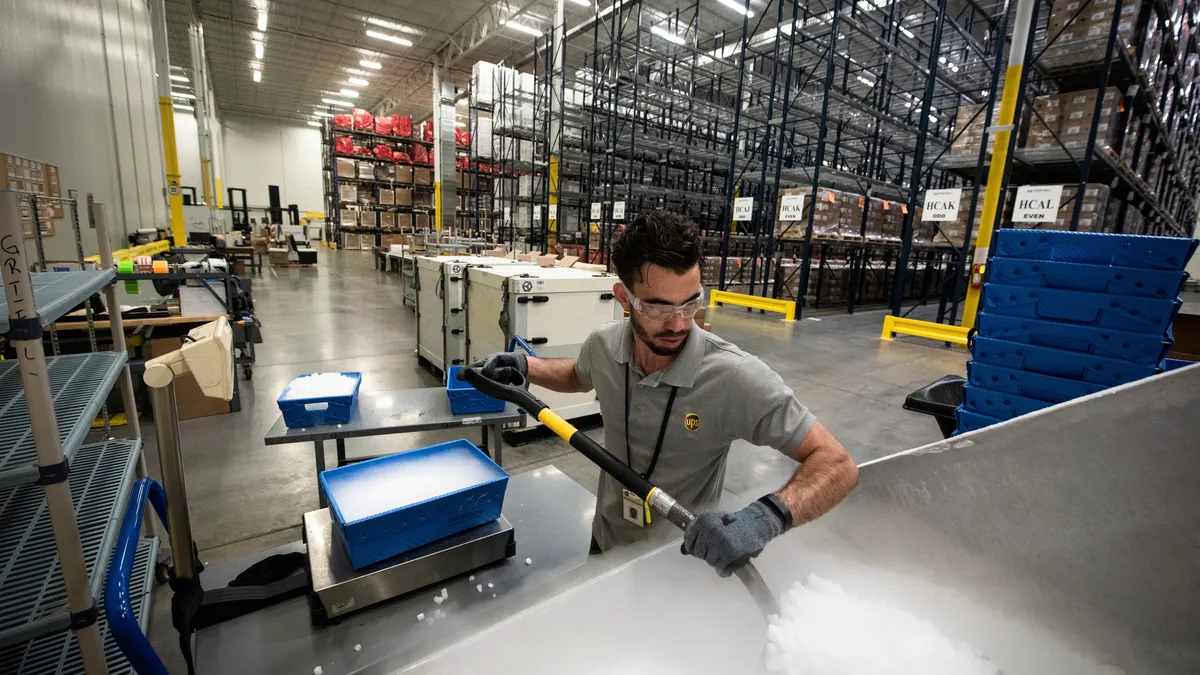Dive Brief:
- UPS is taking the infrastructure and experience it has gained from distributing the COVID-19 vaccine to offer a permanent cold chain solution through its healthcare division that's focused on the transport of pharmaceutical, temperature-sensitive reagents and other medical-related cargo, the logistics provider announced this week.
- The company is pitching UPS Cold Chain Solutions as end-to-end transportation, where UPS takes care of storage, logistics and freight, all while tracking temperature diversions from command centers in Louisville, Kentucky, and Amsterdam.
- The company realized this type of service was needed in the healthcare space as its subsidiary, Marken, worked with pharmaceutical manufacturers for the clinical trials of the COVID-19 vaccine, according to Dan Gagnon, vice president for global healthcare marketing and strategy at UPS. "We began to see as a company what was going to happen," Gagnon said. "We saw the innovation in vaccines; we saw that there [were] new vaccines that were coming out that required frozen storage and frozen transportation."
Dive Insight:
The cold chain for the COVID-19 vaccine was notoriously fickle. This was especially true of the Pfizer vaccine, which required the use of a specially designed insulated box with dry ice inside to keep the temperature at minus 70 degrees Celsius for up to 10 days.
"We've delivered more than 1.1 million shipments, about 196 million vaccine doses to about 50 countries and territories and utilized our UPS premiere service to achieve 99.9% on time delivery," UPS CEO Carol Tomé said on the company's earnings call last month.
The company invested in freezer farms, dry ice production and tracking technology to monitor for temperature diversions. And the company expects their usefulness will continue beyond the COVID-19 vaccine, Gagnon said.

UPS is not alone in seeing an increased demand in this space. The Biopharma Cold Chain Sourcebook expects demand for the pharmaceutical cold chain to grow nearly 24% between 2020 and 2024 to reach $21.3 billion.
"When you take a look at what's happening in the world, the fastest-growing diseases are lifestyle diseases. They are cancers. They're heart conditions, respiratory illnesses. They are diabetes," Gagnon said. "And those fastest-growing diseases are being solved with biologics."
The cold chain infrastructure requirements of biologics does generate "a huge challenge to equitable healthcare delivery, especially during a global pandemic," a group of University of Maryland researchers noted in February.
The best way to move forward with the field is shifting away from the cold chain, according to the researchers. They said this could be done in one of three ways: stabilizing the biologic through improved formulation, engineering removal and renewal mechanisms into the biologic, or by creating the biologics at the point of care to do away with the distribution process altogether.
For now, the distribution process is firmly in place, and UPS' vision is to connect multiple parts of the healthcare supply chain, including the early stages of the drug supply chain.
"Our facilities are designed to really start to serve the drugs substance manufacturer way upstream," Gagnon said.

This means UPS can receive bulk shipments from a pharmaceutical manufacturer's supplier and then distribute them to the factories. But cold chain locations can also serve wholesalers and distributors that are shipping to hospitals and clinics, he said.
UPS said its cold chain foot print covers 11 million square feet in 32 countries. Gagnon said all these locations are temperature controlled with equipment, such as coolers and freezers, that can customize the environment further, as needed. Its freight forwarding business also has cold chain cross-docking services. But the size of this network is expected to grow.
"We're adding about a million square feet of footprint every year," Gagnon said. "I see that continuing. We're going to continue to expand in the key markets that are important to us from a drug manufacturing perspective."
UPS is also expanding the tracking technology that it has been using for the COVID-19 vaccines to bulk shipments, as well as ocean and air freight.
"Then, eventually, it's going to expand across the entire UPS Cold Chain Solutions program," he said. "What I mean by that is ... we'll be able to see a specific product from chemical all the way through to needle."














